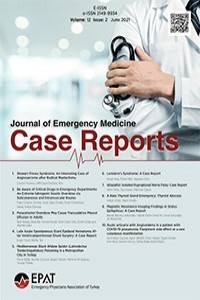Acil Serviste Akut Abdomen Bulgularını Taklit Eden Farklı Bir Neden: Kodein ve Kafein Kombinasyonlarının Oral Alımı
Kodein, kafein, abdominal ağrı, intihar girişimi
A Different Cause of Mimicking Acute Abdominal Findings in the Emergency Department: Ingestion of Codeine and Caffeine Combinations
Codeine, caffeine, abdominal pain, suicide attempt,
___
- Yip L, Garbane BM, Borron SW. Opioids. In: Shannon MW, Borron SW, Burns MJ, eds. Haddad and Winchester’s Clinical Management of Po- isoning and Drug Overdose. 4th ed. Philadelphia: Saunders, 2007. MD Consult Web site. Available at http://www.mdconsult.com Access date May 2, 2011.
- Miner JR, Paris PM, Yealy DM. Pain Management. In: Marx JA, Hockber- ger RS, Walls RM, Adams JG, BarsanWG, Biros MH, et al, eds. Rosen’s Emergency Medicine Concepts and Clinical Practice. Vol 2. 7th ed: Sa- unders, An Imprint of Elsevier Inc.; 2010;p.2410-28.
- Shannon MW. Theophylline and Caffeine. In: Shannon MW, Borron SW, Burns MJ., eds. Haddad and Winchester’s Clinical Management of Po- isoning and Drug Overdose. 4th ed. Philadelphia: Saunders, 2007. MD Consult Web site. Available at. Access date May 2, 2011.
- Yew D, Laczek JT. Toxicity, Caffeine emedicine from WebMD. Nov 5, 2009. http://emedicine.medscape.com. Access date May 2, 2011.
- Holmgren P, Norden-Pettersson L, Ahlner J. Caffeine Fatalities - Four Case Reports. Forensic Sci Int 2004; 139: 71-3. [CrossRef]
- Bardsley CH. Opioids. In: Marx JA, Hockberger RS, Walls RM, Adams JG, BarsanWG, Biros MH, et al., eds. Rosen’s Emergency Medicine Concepts and Clinical Practice. Vol 2. 7th ed: Saunders, An Imprint of Elsevier Inc.; 2010. p.2047-2051.
- Hung OL, Nelson LS. Chapter 184. Acetaminophen. In: Tintinalli JE, Stapczynski JS, Cline DM, Ma OJ, Cydulka RK, Meckler GD, eds. Tintinalli’s Emergency Medicine: A Comprehensive Study Guide. 7th ed: http:// www.accessmedicine.com. Access date May 2, 2011.
- Kirk MA, Baer AB. Anticholinergics and Antihistamines. In: Shannon MW, Borron SW, Burns MJ., eds. Haddad and Winchester’s Clinical Manage- ment of Poisoning and Drug Overdose. 4th ed. Philadelphia: Saunders, 2007. MD Consult Web site. Available at. Access date[ May 2, 2011.
- Boerlin V, Maeglin B, Hägler W, Kuhn M, Nüesch E. Analgesic Activity of Propyphenazone in Patients With Pain Following Oral Surgery. Eur J Clin Pharmacol 1986; 31: 127-31. [CrossRef]
- Hastier P, Buckley MJM, Peten EM, Demuth N, Dumas R, Demarquay JF. A New Source of Drug-Induced Acute Pancreatitis: Codeine. Am J Gastroenterol 2000; 95: 3295-8. [CrossRef]
- Holstege CP. Caffeine. Encyclopedia of Toxicology 2005: 377-9. [CrossRef]
- Biearman BS. Chlorpheniramine Encyclopedia of Toxicology 2005; 577-8.
- Başlangıç: 2010
- Yayıncı: Alpay Azap
Travmatik Tansiyon Pnömoperikardiyum
Penile Fracture Cases Admitted to our ED: Review of 5 Cases
Birdal GÜLLÜPINAR, Aslı ACARER, Burcu DEMİRDÖVEN, Gürkan ERSOY
Şebnem Eren ÇEVİK, Onur YEŞİL, Tuba Cimilli ÖZTÜRK, Özlem GÜNEYSEL
Saç Teline Bağlı Gelişen Turnike Sendromu
Halil KAYA, Özgür SÖĞÜT, İsmail İYNEN, Mustafa Sümer NİMETOĞLU, Mehmet Akif DOKUZOĞLU
Lokalize Abdominal Ağrının Nadir Bir Nedeni Olarak Primer Epiploik Apendijit: Görüntüleme Bulguları
Mehmet Haydar ATALAR, İlhan KORKMAZ
Bir Çocukta Metaklopramid’e Bağlı Akut Distonik Reaksiyon: Bir Olgu Sunumu
Sedat IŞIKAY, Mehmet ALMACIOĞLU, Kutluhan YILMAZ
Oral Lidokain Alımına Bağlı Suisid Girişimi: Olgu Sunumu
Sedat KOÇAK, Birsen ERTEKİN, Hasan KARA, Ayşegül BAYIR
Acil Durumlarda Rekompresyon Tedavisi: Tip II Dekompresyon Hastalığı
Ayşe Semra Demir AKÇA, Fatih Ozan KAHVECİ
Acil Serviste İhmal Edilen Bir Hipertansiyon Nedeni: Primer Hiperaldosteronizm
Melih YÜKSEL, Serkan YILMAZ, Murat PEKDEMİR, Elif YAKA
